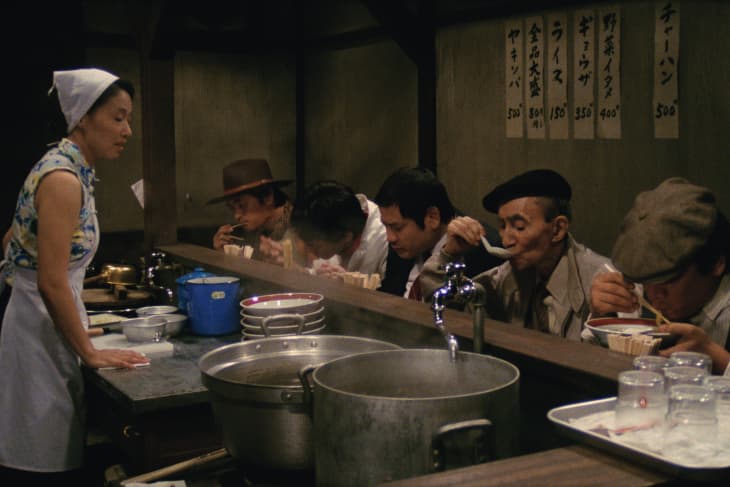5 Things We Learned About Ramen from Tampopo
Ramen is now a familiar part of American cuisine. You might think of instant noodles, your favorite ramen joint, and even trendy takes on the Japanese noodle soup like
ramen burgers
Tampopo may have been one of the first depictions of ramen in American pop culture, and we can’t imagine a better first introduction.
In the film, written and directed by Juzo Itami, a ragtag team of truck drivers, vagabonds, and benefactors band together to help Tampopo (Nobuko Miyamoto), a single mom and ramen shop owner, overhaul her restaurant and make the best ramen in town. Short, humorous vignettes, all of which revolve around food, are interspersed throughout the primary plotline. Eater calls Tampopo “one of the best food movies of all time,” and we’re inclined to agree.
Here are the five things we learned about ramen from this classic Japanese film.
1. Ramen (or Just Food) Is the Great Equalizer
Throughout the film, Tampopo and her supporters receive help perfecting her ramen recipe from all sorts of people. Reminiscent of the classic children’s tale Stone Soup, everyone’s modest contributions come together to form something special. Most notably, a community of vagabonds lends Tampopo their elderly ramen master. Despite their ragtag appearances, the vagabonds are well-versed in all things culinary. In another short vignette, a young, bumbling, lower-level businessman joins his boss and other higher-ups for dinner at a gourmet French restaurant. While the others defer to the senior businessman and order what he orders, the young man quietly displays expert knowledge of the menu and wine list, impressing the waiter and leaving his colleagues’ jaws on the floor.
Tampopo teaches us that first impressions can be deceiving, and that everyone has something valuable to contribute — regardless of their social status or others’ preconceived notions.
2. Everybody’s Ramen Is Different
As part of her quest to make better ramen, Tampopo receives the help of her new gang of friends and observes the methods of her competitors. What does she learn? Everyone has a different recipe. Pisuken (Rikiya Yasuoka), for example, is an enemy-turned-ally who introduces Tampopo to his scallion and pork ramen recipe. When Tampopo goes to snoop out her competitors’ recipes, she discovers that each of them has secret recipes — some keep the fish heads on for their broths, while others let their noodles rise overnight and then knead them an extra round. Each chef’s ramen recipe is a unique fingerprint.
3. The Little Things Matter
Tampopo quickly discovers the reason why most other ramen chefs keep their recipes a closely guarded secret: Every step makes a difference. An extra rolling may lead to smoother noodles; a too-thick slice of chashu, even by a millimeter, might make the difference between great ramen and okay ramen.
These small details matter on the consumer’s end as well. In an early scene of the film, we see the elderly ramen master teach his young protégé, Gun (Ken Watanabe), how to appreciate a bowl of ramen. The master instructs Gun to observe the ramen, “appreciate its gestalt,” express affection by stroking the noodles, and apologize to the pork by saying “see you soon.” All this happens before the first bite. When he does dig in, the master says to start eating the noodles first. “While slurping the noodles,” he says, “look at the pork.”
4. Don’t Boil the Broth
At one point in the film, Tampopo has a nightmare that she accidentally lets her pot of broth come to a boil. According to all the ramen connoisseurs she consults, boiling is a huge no-no because it prevents it from becoming clear. I don’t know what the science behind this is, but if you want to make the best ramen possible, you’d better keep that broth at a simmer.
5. Ramen = Food = Love
Above all, Tampopo is a film about food and love. The work Tampopo puts into her recipe is a labor of love, and the theme runs through many of the vignettes during the movie as well. In one, a man rushes home to find his ailing wife near death, surrounded by their children. Perhaps in an attempt to revive her (or as a commentary on gender norms and division of household labor), he tells her to make dinner for the family. She rises from her deathbed, prepares a fried rice dish, and then promptly drops dead. “Keep on eating,” the father cries to his mourning children, “It’s the last meal mom cooked! Eat while it’s hot.”
Another secondary plotline follows a suave gangster in a white suit and his lover as they communicate their passion and intimacy through the vehicle of food. Ultimately, his last words to her are about wild boar and yam sausage.
Tampopo is certainly a love letter to ramen, but between the lines lie subtle observations about human nature and relationships. The film certainly tells the story of ramen, but it’s also a lens through which we can view ourselves.
Buy It Now: Tampopo, $14
Have you seen Tampopo? What did you learn about ramen from this classic movie? Let us know in the comments.
